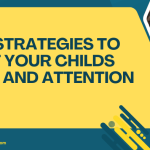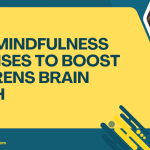Table of Contents
- Introduction
- 1. Altered Brain Structure
- 2. Impact on Memory and Learning
- 3. Emotional Regulation Challenges
- 4. Increased Anxiety and Depression
- 5. Long-term Health Consequences
- Conclusion
- FAQs
Introduction
Stress is an unavoidable part of life, but for children, its effects can be particularly profound. Kids are still developing both emotionally and physically, making them more susceptible to stressors. Understanding how stress impacts brain development can help parents, educators, and caregivers create supportive environments that foster resilience. In this article, we’ll explore the top five ways stress can affect kids’ brain development, along with practical solutions for minimizing these impacts.
1. Altered Brain Structure
Stress can lead to significant changes in the brain’s structure. Research shows that chronic stress, particularly in early childhood, can result in a reduction of gray matter in key areas like the prefrontal cortex and hippocampus. These regions are crucial for decision-making, memory formation, and emotional regulation.
Key Findings:
- Hippocampus Size: Studies have shown that children exposed to high levels of stress may have smaller hippocampi, affecting memory and learning capabilities.
- Prefrontal Cortex Development: The prefrontal cortex, responsible for complex thought processes, may also be underdeveloped in stressed children.
“The hippocampus is essential for memory formation while the prefrontal cortex is key to decision-making. Stress can shrink these vital areas.”
Visual Element
| Brain Structure | Effect of Stress |
|---|---|
| Hippocampus | Reduced size and impaired memory |
| Prefrontal Cortex | Impaired decision-making and emotional control |
For more information on brain development and stress, check out the Harvard Center on the Developing Child.
2. Impact on Memory and Learning
Stress can severely hinder a child’s ability to learn and remember information. Under stress, the body releases cortisol, which can disrupt the formation of new memories and the retrieval of existing ones. This can lead to difficulties in academic settings and hinder overall cognitive development.
Practical Examples:
- Memory Retention: Stressed children might struggle to recall information during tests or presentations. This can create a cycle of anxiety that further impairs their learning capabilities.
- Attention Span: Children under stress may find it harder to concentrate, leading to missed information in class and difficulty completing homework.
“When cortisol levels rise, memory formation drops. This is particularly concerning for students who rely on recall for their academic success.”
To read more about the connection between stress and learning, visit the American Psychological Association.
3. Emotional Regulation Challenges
Stress can disrupt a child’s ability to manage their emotions effectively. When a child frequently experiences stress, their brain may become wired to respond with heightened emotional reactions, leading to issues such as tantrums, anxiety, or withdrawal.
Insights:
- Fight or Flight Response: Chronic stress activates the amygdala, which can lead to an overactive fight or flight response. This may cause children to react more intensely to minor frustrations or challenges.
- Difficulty in Social Situations: Children who struggle with emotional regulation may have trouble forming friendships or participating in group activities, which can exacerbate feelings of isolation.
“The amygdala’s heightened activity can make everyday challenges feel insurmountable for stressed children.”
Helpful Tips:
- Mindfulness Practices: Introducing mindfulness or relaxation techniques can help children learn to better manage their emotions.
For more strategies on emotional regulation, check out Mindful Schools.
4. Increased Anxiety and Depression
The relationship between stress and mental health is well-documented. Children exposed to chronic stress are at a higher risk for developing anxiety and depression, which can further impact their brain development and overall well-being.
Statistics:
- Increased Risk: According to the National Institute of Mental Health, children who experience significant stress are more likely to develop anxiety disorders and depression in their teenage years.
- Feedback Loop: Stress-induced anxiety can lead to further stress, creating a vicious cycle that can be hard to break without intervention.
“Early intervention is crucial. A child’s mental health can shape their future, influencing both personal and academic success.”
Addressing mental health early can mitigate these risks. For more information, visit the National Alliance on Mental Illness.
5. Long-term Health Consequences
The effects of stress during childhood can extend into adulthood, influencing not just mental health but also physical health. Children who experience chronic stress are at risk for various long-term conditions, including heart disease, obesity, and autoimmune disorders.
Long-term Effects:
- Health Disparities: Research indicates that children from low-income families or unstable environments may experience more significant health issues due to chronic stress.
- Behavioral Problems: Long-term stress can lead to behavioral issues that persist into adulthood, affecting relationships and career opportunities.
“The seeds of lifelong health problems can be sown in childhood. Addressing stress can alter the trajectory of a child’s future.”
Preventive Measures:
- Supportive Environment: Building a stable and nurturing environment can help mitigate these risks. Simple actions like maintaining routines, providing emotional support, and ensuring open communication can go a long way.
For more insights into the long-term effects of stress, you can refer to the Centers for Disease Control and Prevention.
Conclusion
Understanding the effects of stress on kids’ brain development is crucial for fostering healthy growth and emotional well-being. By recognizing how stress alters brain structure, impacts memory and learning, challenges emotional regulation, increases anxiety and depression, and leads to long-term health consequences, we can take proactive steps to support our children. Creating a nurturing environment, encouraging open dialogue, and implementing stress-reduction techniques can help protect our children from the negative impacts of stress.
FAQs
Q: How can I tell if my child is stressed?
A: Look for signs such as changes in behavior, difficulty sleeping, changes in appetite, or increased irritability. If you notice any concerning behaviors, consider consulting a professional.
Q: What can I do to help my child manage stress?
A: Encourage regular physical activity, establish a routine, provide emotional support, and introduce relaxation techniques like deep breathing or mindfulness.
Q: Is some stress normal for children?
A: Yes, some stress is a normal part of growing up. However, chronic or excessive stress can have detrimental effects on a child’s development.
Q: Should I seek professional help for my child?
A: If your child is showing signs of significant stress, anxiety, or depression, it’s essential to consult a healthcare professional for guidance.
By understanding the effects of stress on children, we can better support their development and well-being. Let’s work together to create a more resilient future for our kids!
Also Look For:
- Top 5 Reasons Neuro Care is Essential in Modern Medicine
- Top 5 Lifestyle Changes to Prevent Neurological Disorders
- Top 5 Tips for Choosing the Right Neurologist





